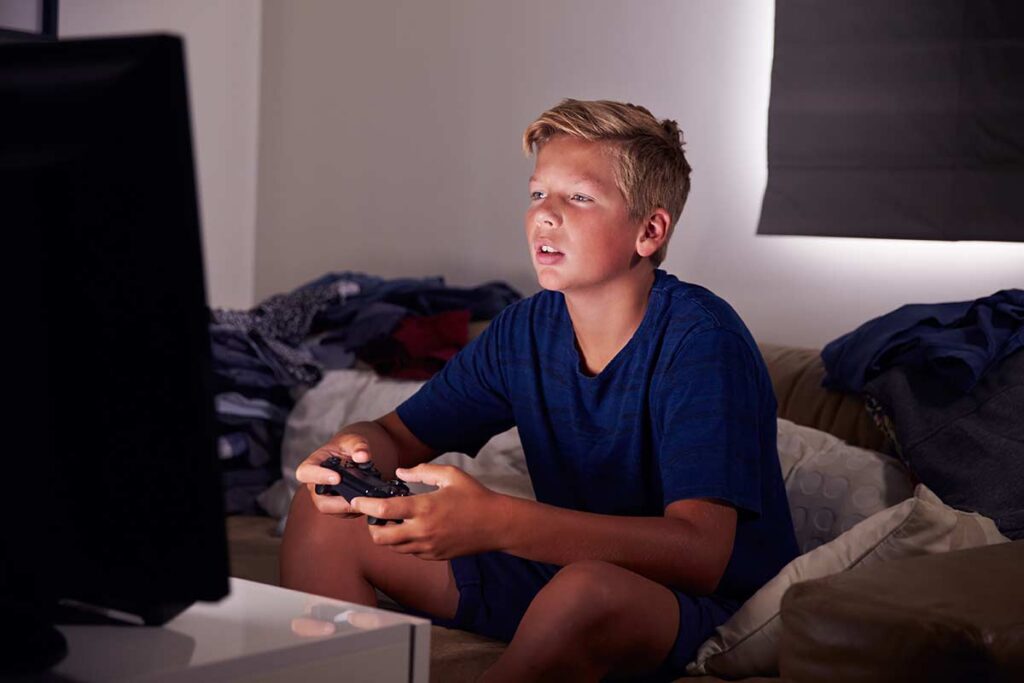Gaming has become more realistic than ever before. The level of graphic improvement in games is so much that it’s easy to see how some teens can view these game situations as real-life experiences. However, gaming can lead to negative behaviors and, in some cases, make mental health disorders more severe. If you are seeing unwanted changes in your son, it may be time to help them. At Foothills at Red Oak Recovery, we can provide exceptional support in this process. Call 866.300.5275 to learn more about our gaming addiction treatment program.
What Can Gaming Do to Your Son?
The development of morals happens over time. It occurs as a person moves through life through various experiences. Morals also develop from what a person sees on TV, engages in online using social media, and experiences during play, including gaming. What can this type of exposure do to your son’s moral development?
- Violent behavior displayed on TV becomes second nature. It’s no longer shocking. In gaming, a person may experience feelings of pleasure when watching an opponent die. That can translate into less sensitivity to experiences around them.
- Moral reasoning can change. Gaming changes the way a person accomplishes tasks and works towards achievements. Those tasks they are working so hard to manage in a game become a priority, even if they are not morally acceptable. Beating someone, stealing something, or engaging in abuse becomes “okay” in the game, and that type of reasoning can carry over into real life.
- It impacts undeveloped emotions. When adolescent males engage in a game, they may experience feelings ranging from anger to passion. Yet, because teen brains are not fully developed, they may never learn to express themselves wholly or, if they do, they may lack emotion regulation.
There is no doubt that when a person sees something violent repeatedly, this will impact the way they perceive threats. For example, a violent video game may teach a young teen that hitting others will solve their problem. While in real life, you may never condone this behavior, and you may even think it is just a game, that repeated experience creates changes in the teen’s brain. Most teens do not act on this, but it can lead to more aggression in their day-to-day activities.
How Do You Know When Your Teen Needs Help?
Many games can help teens embrace skills and connections with others without the harmful components to them. Yet, even if you do everything you can to minimize exposure to violent and otherwise inappropriate gaming, they can still experience it. That’s why it is so essential to work to prevent poor outcomes and behaviors.
If you are already seeing your son change in terms of personality and behavior, it’s time to get help. Our team at Foothills at Red Oak Recovery can offer insights and tools to help parents encourage their teens to understand what they are experiencing and why it can be damaging.
Like any other disorder, gaming addiction can also be a factor, especially if a teen is frequently emersed in it. Yet, there is help through a wide range of treatment programs and therapies, including those that we offer, such as:
- Trauma treatment programs
- Holistic healing programs
- Co-occurring disorder treatment
- Substance abuse treatment
- Process addiction treatment
These treatment options can give teens the emotional guidance they need to overcome aggression and gaming addiction.
Ready to See Change? The Foothills at Red Oak Recovery Can Offer Help
When your son engages in violent behavior or struggles with aggression, it’s time to seek out support. At Foothills at Red Oak Recovery, we provide a comprehensive treatment program that can offer significant help and results. The key is to make the call to allow our professionals to help you. Learn more when you call us at 866.300.5275 or reach out to us online.

